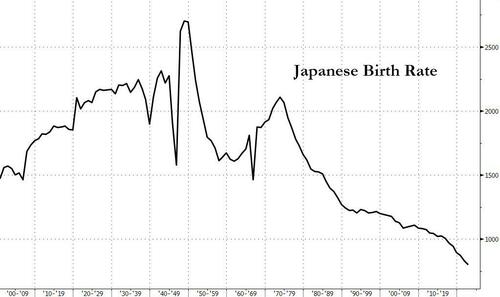Japan’s Birth Rate Plummets To Record Low For Seventh Straight Year
Authored by Aldgra Fredly via The Epoch Times,
Japan’s birth rate declined to a record low for the seventh consecutive year, with the number of babies born falling below 800,000 this year, health ministry data showed on June 2.
The number of newborns in Japan fell to 770,747 this year, down 40,875 from the previous year and the lowest since the country began record-keeping in 1899, Kyodo News reported, citing health ministry data.
Japan’s fertility rate—the average number of children born to a woman in her lifetime—fell from 1.30 in 2021 to 1.26 last year, equivalent to the previous low recorded in 2005. The number is far below the 2.07 rate necessary to sustain a stable population.
The decline in Japan’s birth rate is attributed to people delaying parenthood due to the economic impact brought on by the COVID-19 pandemic, as well as the prevailing trend among couples to delay marriage, according to the report.
The data was released after Prime Minister Fumio Kishida unveiled a draft plan to increase child-rearing support as he listed addressing the country’s declining birth rates as one of his top policy goals.
“A last chance for us to reverse the declining births is before the young population is expected to decline drastically in 2030,” Kishida said at a meeting on Thursday.
Kishida’s government said it would come up with specific measures and secure funding by the end of the year.
The government plans to secure annual funding of about 3.5 trillion yen ($25.2 billion) over the next three years for a new childcare package, which includes childbirth and rearing allowances as well as increased subsidies for higher education.
Earlier in January, Kishida urged his government to create a “children-first economic society” and warned that Japan would cease to function as a society if its birth rate continued to decline.
“Japan is at a critical point of whether we can continue to function as a society. Focusing on policies regarding children and child-rearing is an issue that cannot be postponed,” he told parliament on Jan. 23.
Japan’s population of more than 125 million has been declining for 16 years and is projected to fall to 87 million by 2070. A shrinking and aging population has huge implications for the economy and for national security as Japan fortifies its military to counter China’s increasingly assertive territorial ambitions.
According to Japan Meteorological Agency (pdf), the country’s population is expected to fall below 100 million by 2050. Data released by the Cabinet Office showed the aging population is also a prominent issue. As of October 2019, the country’s total population was 126.17 million, where people over the age of 65 accounted for 28.4 percent.
Upon taking serious note of the issue, the country introduced a series of policies to remedy its declining births. Japan has, in recent years, offered cash bonuses and childcare incentives to encourage people to have more children, but these efforts have had little impact.
According to Yomiuri Shimbun’s report, for more than 30 years, the government has introduced various policies that focus on balancing work and childcare. However, those policies were considered inconsistent with the actual needs of families, leaving those wanting to marry and have children without strong prospects.
The report cited Yamada Masahiro, a professor at Chuo University in Tokyo, who spent over 30 years studying Japan’s population problem and wrote a book titled “Why Japan’s Countermeasures Against Declining Births Failed?”
The book claimed that one of the problems is that “the government’s support measures are biased toward women who have graduated from colleges and regular workers in urban areas while ignoring the needs of informal workers and women living in non-urban areas.”
Tyler Durden
Sun, 06/04/2023 – 17:30
via ZeroHedge News https://ift.tt/MC3pSRB Tyler Durden

